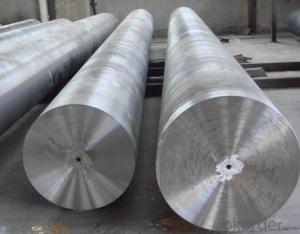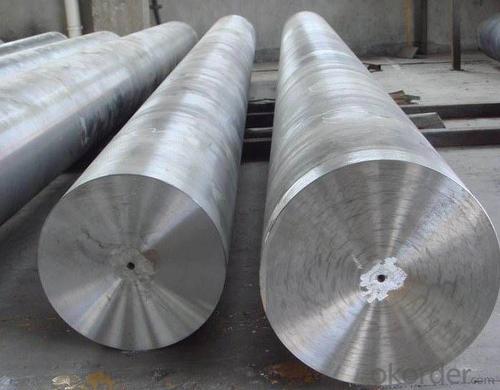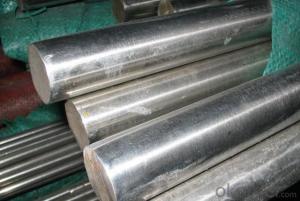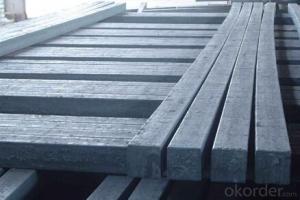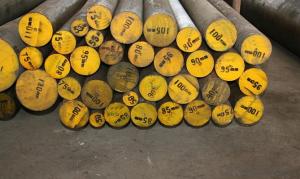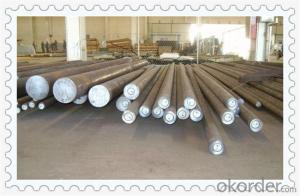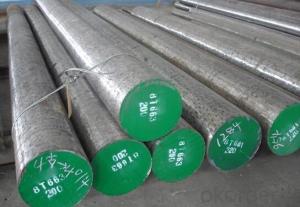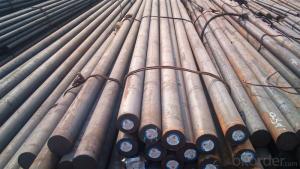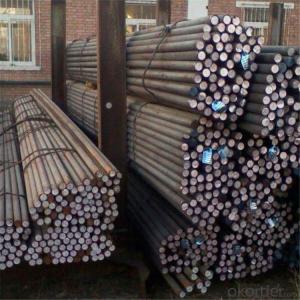AISI 5140 Hot Rolled Steel Round Bar in Stock
- Loading Port:
- Tianjin
- Payment Terms:
- TT OR LC
- Min Order Qty:
- 25 m.t.
- Supply Capability:
- 50000 m.t./month
OKorder Service Pledge
OKorder Financial Service
You Might Also Like
Specification
AISI 5140 Hot Rolled Steel Round Bar in Stock
Product Description:
1. Length: 3000mm-12000mm
2. Diameter: 10mm-250mm
3. Process: EAF + LF + VD + rolled + Heat Treatment (optional)
4. Delivery condition: Hot rolled + Black surface (optional)
5. Rolled ratio: no less than 7:1
6. Straightness: 3mm/M max
7. Test: ultrasonic test according to SEP 1921-84 Group 3 C/c or A388
8. Marking: Heat No. , Steel grade, diameter (mm), length (mm), weight (ton)
Chemical composition:
C | Si | Mn | Cr | Ni | Cu |
Equal or less than | |||||
0.37~0.44 | 0.17~0.37 | 0.50-0.80 | 0.30 | 0.30 | 0.30 |
Application:
Our products have been used in all kinds of areas, such as aviation,aerospace,navigation,
nuclear energy,chemical industry,electronic information,achine manufacture, petrochemical,
automotive,instrument and meter, Communication ,transportation, and medical instruments, etc.
This alloy responds well to heat treatment. Its chromium content provides good hardenss penetration, and the molybdenum imparts uniformity of hardness and high strength. In the annealed condition it machines at 110 sfm. Other desirable properties include good wear resistance, excellent toughness and good ductility in the quenched and tempered condition.
Product Show:
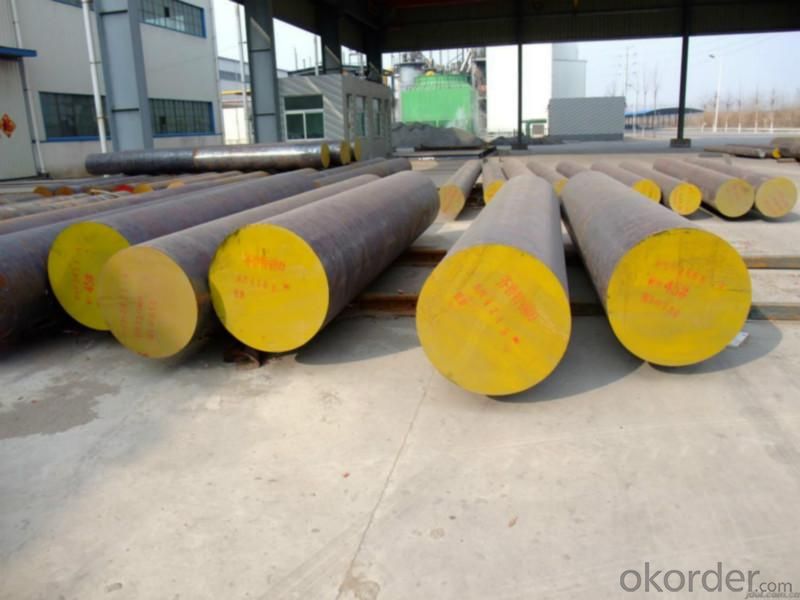
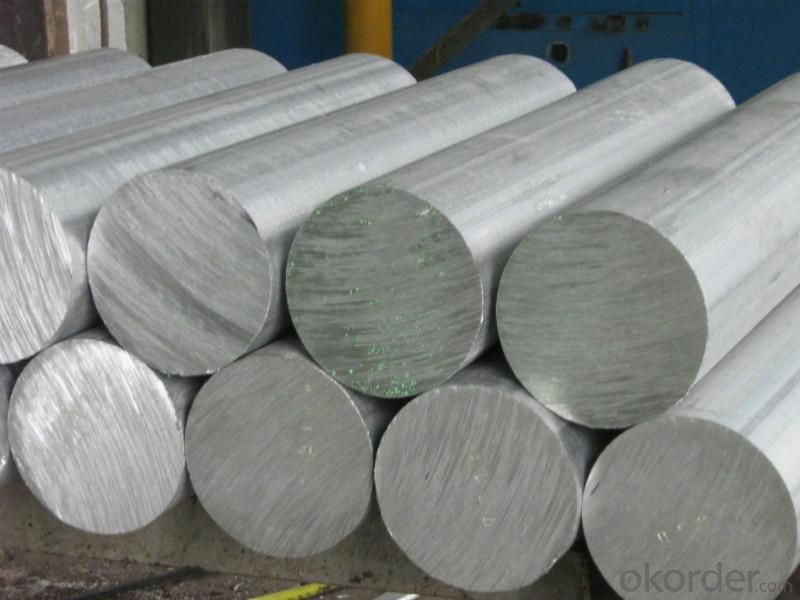
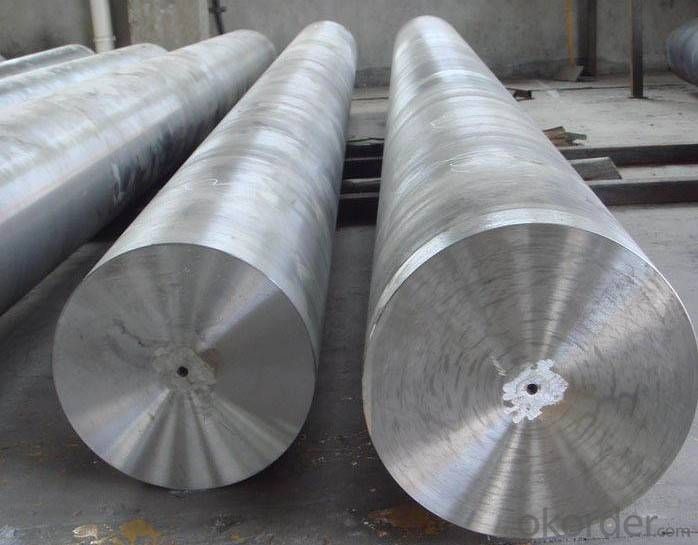
- Q: What are the different types of wear-resistant steel?
- There are several different types of wear-resistant steel, including AR400, AR500, HARDOX, and DOMEX. These types of steel are specifically designed to withstand abrasive wear and impact, making them ideal for applications such as mining equipment, excavator buckets, and conveyor systems. They have high hardness and toughness properties, which help to prolong the lifespan of the equipment and reduce maintenance costs.
- Q: What are the different chemical resistance grades of special steel?
- Special steels, often referred to as stainless steels, are known for their excellent resistance to corrosion and chemical attack. They are a group of alloys that contain a high proportion of chromium, which forms a protective oxide layer on the surface, preventing further corrosion. The resistance of special steel to various chemicals can vary depending on the specific grade or alloy composition. Here are some of the common chemical resistance grades of special steel: 1. Austenitic Stainless Steel: This is the most common type of stainless steel and offers excellent resistance to a wide range of chemicals, including organic acids, alkalis, and salts. The most widely used grade within this group is 304 stainless steel. 2. Ferritic Stainless Steel: Ferritic stainless steels have lower corrosion resistance compared to austenitic grades but still offer good resistance to many chemicals. They are particularly resistant to nitric acid and some organic acids. Grade 430 stainless steel is a common example of ferritic stainless steel. 3. Martensitic Stainless Steel: Martensitic stainless steels are known for their high strength and hardness. While they have lower corrosion resistance compared to austenitic and ferritic grades, they can still exhibit good resistance to certain chemicals, especially in mildly corrosive environments. 4. Duplex Stainless Steel: This type of stainless steel combines the properties of both austenitic and ferritic grades, providing enhanced strength and improved resistance to stress corrosion cracking. Duplex stainless steels offer excellent resistance to a wide range of chemicals, including organic acids, chloride-containing solutions, and saltwater. 5. Precipitation-Hardening Stainless Steel: These steels can be heat-treated to achieve high strength and corrosion resistance. They are typically resistant to a wide range of chemicals, including organic acids, alkalis, and some organic solvents. It's important to note that the chemical resistance of any steel grade can also be influenced by factors such as temperature, concentration of the chemical, and the presence of other corrosive agents. Therefore, it is advisable to consult the manufacturer's specifications or seek expert advice when selecting a special steel grade for specific chemical resistance requirements.
- Q: Carbon steel and stainless steel and pattern steel and special steel and high carbon steel difference
- Stainless steel with high chromium content and high grade steel is forged together with different steel
- Q: What are the main advantages of using special steel in the food processing industry?
- The main advantages of using special steel in the food processing industry are its high resistance to corrosion, durability, and hygiene. Special steel is specifically designed to withstand harsh environments, such as exposure to acidic or alkaline substances, which are common in food processing. It does not rust or react with food, ensuring the quality and safety of the final product. Additionally, special steel is easy to clean and maintain, making it an ideal choice for food processing equipment.
- Q: Can special steel be used for making renewable energy equipment?
- Making renewable energy equipment is possible using special steel. Special steel, also referred to as high-performance or alloy steel, possesses various properties that make it appropriate for use in different renewable energy applications. For instance, in wind energy, special steel finds utility in crafting wind turbine components, including rotor blades, tower structures, and drive train systems. The durability and longevity of these components are ensured by the high strength and corrosion resistance of special steel, as they are consistently exposed to harsh weather conditions and mechanical stress. In solar energy, special steel can be employed in the construction of solar panels, support structures, and tracking systems. The material's exceptional thermal conductivity and resistance to deformation make it an ideal choice for effectively capturing and converting solar energy into electricity. Moreover, special steel can be utilized in the production of hydroelectric power equipment, such as turbine blades, runners, and penstocks. These components are designed to withstand the forces and pressures associated with water power generation, and special steel's high tensile strength and resistance to erosion and cavitation make it suitable for this purpose. Furthermore, in the realm of biomass energy, special steel can be used in the fabrication of bioenergy plants and equipment. Its ability to withstand high temperatures and resist corrosion makes it suitable for handling the corrosive substances and high temperatures involved in the biomass conversion process. Overall, special steel's unique combination of strength, durability, corrosion resistance, and thermal properties makes it an excellent option for manufacturing renewable energy equipment, thereby contributing to the development and sustainability of the renewable energy industry.
- Q: How does special steel perform in aerospace applications?
- Due to its exceptional performance and unique properties, special steel finds extensive use in aerospace applications. A primary reason for its usage lies in its high strength-to-weight ratio, a crucial factor in the aerospace industry where weight reduction is of utmost importance. Special steel alloys exhibit superior strength, enabling them to withstand the extreme conditions experienced during flight, including high temperatures, vibrations, and pressure changes. Moreover, special steel possesses excellent corrosion resistance, making it an ideal choice for aerospace applications where exposure to moisture and various chemicals is common. Its corrosion resistance ensures the durability and longevity of critical components, resulting in reduced maintenance and replacement costs. Furthermore, special steel offers excellent fatigue resistance, allowing it to endure repeated loading and unloading cycles without deformation or failure. This property is vital in aerospace applications where components must withstand cyclic stresses and maintain their integrity for extended periods. Additionally, special steel alloys can be readily fabricated and machined, facilitating the production of intricate and precise aerospace components. The ease of fabrication ensures efficient manufacturing processes and the ability to create complex designs, which are essential for optimizing performance and aerodynamics. In conclusion, special steel's exceptional strength, corrosion resistance, fatigue resistance, and ease of fabrication make it an invaluable material in aerospace applications. Its utilization in critical components, such as turbine blades, landing gears, and structural elements, guarantees the safety, reliability, and efficiency of aerospace systems.
- Q: What are the different methods of surface grinding for special steel?
- There are several methods of surface grinding for special steel, including peripheral grinding, creep feed grinding, and multi-axis grinding.
- Q: How is high-speed tool steel used in the manufacturing of drills and taps?
- High-speed tool steel is used in the manufacturing of drills and taps because of its exceptional hardness, wear resistance, and heat resistance properties. This type of steel allows drills and taps to withstand high temperatures and friction, ensuring their durability and longevity. Additionally, high-speed tool steel enables these cutting tools to maintain their sharpness for longer periods, resulting in increased efficiency and precision during drilling and tapping operations.
- Q: How does special steel perform in terms of thermal conductivity?
- Special steel typically has lower thermal conductivity compared to other materials. This means that it is not as efficient in conducting heat and may retain heat for longer periods of time.
- Q: What are the challenges faced in the manufacturing process of special steel?
- There are several challenges faced in the manufacturing process of special steel. Firstly, the raw materials used in special steel production, such as alloying elements, need to be carefully selected and sourced to ensure high quality and desired properties. Secondly, the melting and casting process requires precise control of temperatures and cooling rates to prevent defects and achieve uniformity. Thirdly, achieving the desired composition and microstructure through heat treatment can be complex and time-consuming. Additionally, maintaining consistent quality throughout the entire production process can be a challenge, as any variation in parameters can result in variations in the final product. Finally, ensuring compliance with stringent industry standards and regulations adds another layer of complexity to the manufacturing process of special steel.
Send your message to us
AISI 5140 Hot Rolled Steel Round Bar in Stock
- Loading Port:
- Tianjin
- Payment Terms:
- TT OR LC
- Min Order Qty:
- 25 m.t.
- Supply Capability:
- 50000 m.t./month
OKorder Service Pledge
OKorder Financial Service
Similar products
Hot products
Hot Searches
Related keywords
